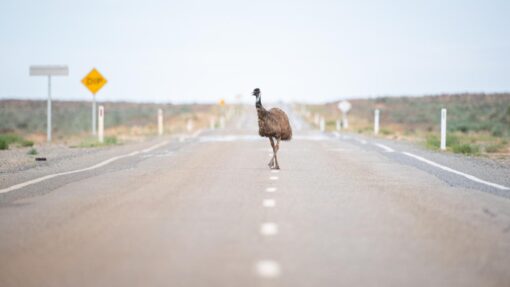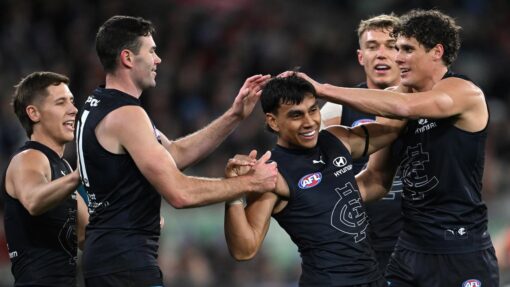George Negus dies after long battle with Alzheimer’s
Katelyn Catanzariti |

Newsman George Negus, who has died aged 82 after a long battle with Alzheimer’s disease, will be remembered as an icon of Australian journalism.
His death was announced on Wednesday on social media.
Passionate about breaking down the big stories, Negus once had the gumption and charm to question Margaret Thatcher about being “pig-headed” and Muammar Gaddafi about being a dictator.
Negus, of the open-necked shirts and thick moustache, ushered in a new, energetic and unequivocally Australian era of television journalism.
“Somebody said to me once that they thought the greatest contribution I made to Australian journalism was not to go to the jungles and deserts with a coat and tie on. So I took them off,” he said.
Born in Brisbane on March 13, 1942, Negus was a high school teacher until his late 20s, when he “conned” his way into journalism.
He wrote for the The Australian and the Australian Financial Review before stepping in front of the camera for ABC television’s hard-hitting current affairs program This Day Tonight.
After a stint as press secretary for then attorney-general Lionel Murphy during the Whitlam government, he returned to journalism as one of the three original reporters, alongside Ian Leslie and Ray Martin, on Nine’s version of America’s 60 Minutes program in 1979.
On the switch to commercial television, Negus said addressing the everyday Aussie became his passion.
“It became important to me – a lot of Australians weren’t being treated with the right respect – they were being treated like they were idiots because they watched commercial television,” he said.
“But what we’re doing turned out to be a little bit better than idiotic.”
He co-hosted the news and current affairs show for seven years as it became a ratings juggernaut.
At its peak in the 1980s, at least a third of the national TV audience were tuning in on a Sunday evening.
Later Negus would become the first host of the ABC international current affairs program Foreign Correspondent, fronting it from 1992 to 1999.
He became a household name reporting on global issues, often from war zones.
“I guess it sounds a bit pretentious, but I would describe myself as an anti-war correspondent,” the news veteran said when reflecting on a career that spanned five decades.
“I’m a committed coward. I’d go so far as to say I was a gutless wonder. I didn’t get a buzz out of that kind of journalism at all.
“I did it because you have to get close enough to tell people why you shouldn’t be there at all.”
Negus took pride in breaking down complicated political issues and communicating them Australia-wide.
“If you can throw some light into dark corners for people who don’t necessarily have as much opportunity to work out why the hell things happen … that’s why I ended up being a current affairs person,” Negus said in 2015.
That year he was made a Member of the Order of Australia for significant service to the media as a journalist and television presenter, and to conservation and the environment.
Negus also presented Nine’s Today Show and SBS’s Dateline program, was a regular on Ten’s 7pm Project and had two current affairs programs: George Negus Tonight on ABC and 6.30 with George Negus on Ten.
“I’ve always been fascinated by what makes places and people and politics in particular tick,” he said.

“Politics is the best way to solve problems without killing each other.”
Negus’ swagger and roguish charm enabled him to win over countless big-name interview subjects, from Libya’s Gaddafi (who denied being a dictator) to movie stars and musicians.
Arguably his most famous interview was a 1981 sit-down with the UK Prime Minister Margaret Thatcher, dubbed “the most powerful woman on the planet”.
After asking just two of his 20 pre-approved questions, Negus went off-script, asking the Iron Lady why the British people considered her “plain pig-headed”.
The frosty exchange that followed made headlines around the world.
This irreverent and engaging style of questioning, always delivered with a twinkle in his eye, was authentically Negus, on and off screen.
“People say to me ‘when I meet you, you’re just like you are on television’. I say ‘no, you’ve got it wrong: on television, I’m just like I am’,” he said.
“If you think you know me, you do.”
In 2021, Negus’ partner, filmmaker Kirsty Cockburn, and adult sons Ned and Serge shared the news he had been diagnosed with Alzheimer’s disease and had moved from Bellingen on the NSW Mid-North Coast to a Sydney nursing home.
A few months later, Negus’ career was celebrated at the 2022 Walkley Awards with a gong for Outstanding Contribution to Journalism.
It was accepted on his behalf by his son Serge, who wore an open-necked shirt with no tie to the black tie event, in tribute to his father.
“Dad was more focused on the audience not being intimidated by authority figures so they could feel relaxed and open to absorbing good information and not be intimidated by it because the person delivering it didn’t look or sound like them,” he said.
AAP


